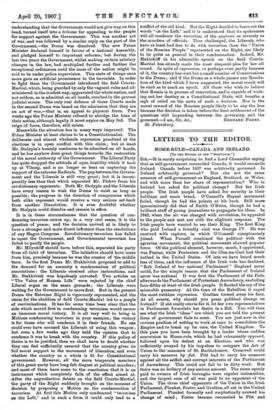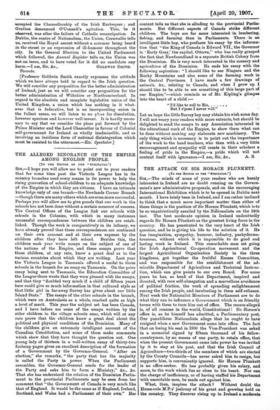LETTERS TO THE EDITOR.
HOME-RULE—CANADA AND IRELAND.
[To THE EDETOR Or THE SPECTATOR.") SIR,—It is surely surprising to find a Lord Chancellor saying that as self-government reconciled Canada, it would reconcile Ireland. Canada before 1837 was arbitrarily governed. Is Ireland arbitrarily governed ? Has she not the same measure of self-government as England, Scotland, or Wales, and with more than her share of representation ? Who in Ireland has asked for political change ? Not the Irish people. The Irish people have asked for security in their holdings and more bread. O'Connell's Repeal movement failed, though he had the priests at his back. Still more ignominiously did thitt of Smith O'Brien, though he had a brilliant staff of young journalists to propagate his ideas. In 1848, when the air was charged with revolution, he appealed to the people and met not with the slightest response. The Irish people have wanted to see their King. The first King who paid Ireland a friendly visit was George IV. He was received with rapture, in which O'Connell conspicuously joined. When Parnell combined the political with the agrarian movement, the political movement showed popular force. Of the political element, however, much, I apprehend, was Fenian, while Fenianism and the Clan-na-Gael had their hotbed in the United States. Of late we have heard much less of them, and the influence of the Irish vote has declined. "Rob Ireland of her national Parliament" England never could, for the simple reason that the Parliament of Ireland never was nationaL It was first the Parliament of the Pale, afterwards the Parliament of Protestant Ascendency, excluding four-fifths at least of the Irish people. It flouted the cry of the miserable peasantry. At the time of the Rebellion it urged the most ruthless repression. Grattan turned away his face. At all events, why should you press political change on Ireland? If she really craves for it, let her own representatives in Parliament formulate her desire in a Bill. You will then see what the Irish " ideas " are which you are told the present form of government fails to meet. You are just now in the curious position of setting to work at once to consolidate the Empire and to break up its core, the United Kingdom. To this pass you have been brought by a leader whose sudden conversion to Home-rule, which he had vehemently opposed, followed upon his defeat at an Election, and who was sufficiently swayed by his impulses to compare the Act of Union to the massacre of St. Bartholomew. Cromwell could carry his measure by fiat. Pitt had to carry his measure against all the selfish and corrupt interests of the Parliament of Ascendency. This could not fail to be dirty work. But there was no bribery of any serious amount. The sums openly paid to owners of Irish boroughs were regular indemnities, and the largest sum of all was paid to an opponent of the Union. The three chief opponents of the Union in the Irish Parliament, Plunket, Foster, and Grattan, all sat in the United Parliament. Plunket formally and emphatically avowed his change of mind ; Foster became reconciled to Pitt and
accepted the Chancellorship of the Irish Exchequer ; and Grattan denounced O'Connell's agitation. This, be it observed, was after the failure of Catholic emancipation. In Dublin, the centre of Nationalism, the Union, Cornwallis tells us, received the Royal assent without a murmur being heard in the street or an expression of ill-humour throughout the city. In the General Election to the United Parliament which followed, the Annual Register tells us, the Union was not an issue, and to have voted for it did no candidate any [Professor Goldwin Smith exactly expresses the attitude which we have always held in regard to the Irish question. We will consider any proposition for the better administration of Ireland, just as we will consider any proposition for the better administration of Wiltshire or Northumberland. In regard to the absolute and complete legislative union of the United Kingdom, a union which has nothing in it what- ever that is federative, but is an incorporating union in the fullest sense, we will listen to no Oats for dissolution, however specious and however well-meant. It is hardly neces- sary to say that we consider the pleas put forward by the Prime Minister and the Lord Chancellor in favour of Colonial self-government for Ireland as wholly inadmissible, and as involving' an insidious 'form of national disintegration which must be resisted to the uttermost.—En. Spectator.]











































 Previous page
Previous page